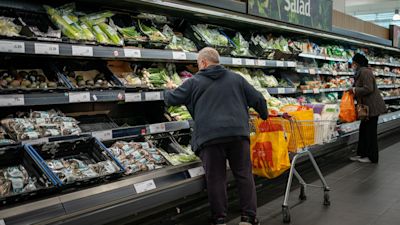Insight
'There’s more to life than GDP but it helps': UK economy contracts in April by 0.3%

'We are in the foothills of a very tight squeeze on our living standards', ITV News Business and Economics Editor Joel Hills reports
Sometimes things look worse than they actually are. The drop in economic activity in April (-0.3%) was larger than forecast but it was driven by the scaling back of the government’s NHS Test and Trace and vaccination programmes. At peak pandemic, tens of thousands of people were administering two million jabs and processing almost seven million tests a week. Without the phasing out of these programmes, the UK economy would have grown in April but the chancellor is wise not to make too much of this point. Firstly, the government’s splurge on healthcare flattered the performance of the economy during the pandemic.
Secondly, growth in April without the drag from these programmes was a very feeble looking 0.1% and won’t do much to allay the concern that we may be heading for a recession. “Countries around the world are seeing slowing growth, and the UK is not immune from these challenges,” Rishi Sunak said this morning. “We have a plan to turbocharge productivity through investment in capital, people and ideas, so everyone across the country can benefit from a strong, healthy economy.”
April was the month when the squeeze on household budgets started to intensify. Energy bills rose, as did taxes. Belts are being tightened and, at some point, this will impact growth. Interestingly though, higher inflation and higher interest rates don’t seem to have put much of a dent in the GDP numbers for April. Spending in consumer-facing services, often a canary in the coal mine if there’s trouble ahead, rose by a healthy looking 2.6%.
Although the ONS notes that manufacturers reported being clobbered by soaring energy prices. There’s more to life than GDP but goodness it helps, particularly if you are a government whose popularity is in decline. Two weeks ago, the chancellor pledged more support to help households with the rising cost of living. The prime minister says stronger economic growth offers the best hope of a prosperous future and is his top priority. But the UK economy hasn’t grown, in monthly terms, since January and the road ahead looks barren. Inflation is at a 40-year high and the Bank of England is expected to raise interest rates again on Thursday. If the OECD is right, the UK economy will grind to a halt next year amid rampant inflation and tax rises. Of the G20 nations, the OECD predicts that only the (heavily sanctioned) Russian economy will perform worse than the UK’s.